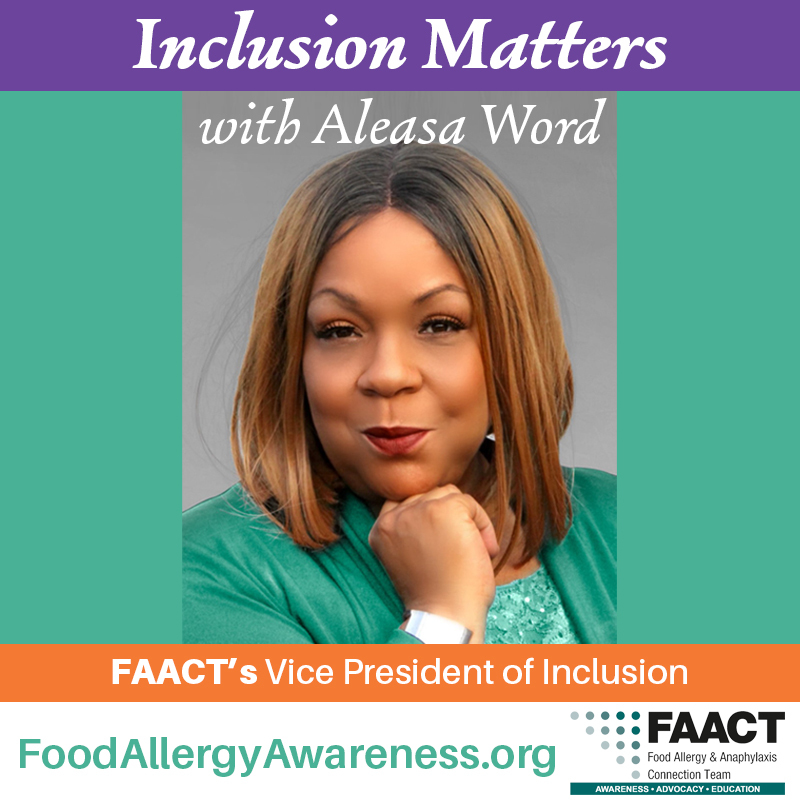Your Plate, Your Rules: Setting Boundaries with Food Allergies
Subcategories

Your Plate, Your Rules: Setting Boundaries with Food Allergies
by Aleasa Word, FAACT Vice President of Inclusion Initiatives
October 2025
One of the things I didn’t anticipate when I began this food allergy journey more than 20 years ago was the constant balancing of vigilance, planning, and emotional resilience. For many in this community, it’s not just about staying safe, it’s also about preserving dignity and peace of mind in the face of people who don’t always respect your choices. Managing food allergies means managing choice, and that can be different for everyone. Whether it’s navigating restaurant menus, grocery aisles, or school events, managing the opinions of naysayers who believe their way of handling food allergies is “better than yours” can be taxing.
From dismissive relatives to close friends who THINK they can say whatever they want as so-called “truth tellers,” naysayers can leave you second guessing your decisions and feeling isolated. Don’t forget the important truth: There is no one-size-fits-all approach to food allergy management. What works for your family might not work for the next, and that is just fine! Our ultimate goal is SAFETY FIRST! It can also be helpful to have a strategy prepared for handling criticism, which helps protect your health, confidence, and relationships without getting pulled into unnecessary battles. Following are tips to help you prepare for the next encounter.
Identify the Doubters
When someone questions your allergy management style, it often says more about them than it ever will about you. Some people will minimize your aversion to risk because they’ve never seen a serious allergic reaction. Others think you’re “too strict” because they value convenience over safety. And there are those who thrive on comparison, eager to prove their approach is superior.
Recognizing the source of their doubt helps you respond with perspective. If Aunt Linda is adamant that “we never carried medication when your cousin was little, and he was fine,” it’s not about your judgment, it’s about her limited experience. This shift in mindset can help you avoid spiraling into defensiveness. Even if you make a convincing argument, your stance is not going to change the tide as much as their willingness to learn is.
Arm Yourself With Knowledge
It isn’t easy dealing with doubters but know that confidence comes from clarity. The more you understand the nuances of food allergies for yourself or those you care for, the less likely you’ll be swayed by critics. Be prepared. Arm yourself with facts from your board-certified allergist, peer-reviewed studies, and respected organizations with dedicated information.
When you face challenges (and you will)—for example, when someone says, “A little XXX won’t hurt”—calmly respond that strict avoidance is the recommendation for food allergies. Don’t worry about over-explaining or debating people. Instead, stay grounded in your understanding of food allergies and the recommendations from physicians. Here you can start to set boundaries or polish them up.
Set Boundaries
Boundaries are a form of self-protection, whether physical or emotional. They are often mentioned with regard to intimate relationships, but they permeate every type of relationship, including:
- Family
- Friends
- School staff/caregivers
- Workplaces
Imagine yourself making statements like, “Unless all ingredients are verified, we can’t accept homemade foods,” or “The restaurant can’t guarantee the ingredients, so we will have to choose a different location.” Boundaries don’t have to be harsh. They must have enough flexibility for every to understand them but enough rigidity to keep you or your loved ones safe. These boundaries will also help preserve much needed energy when battles arise.
Pick Your Battles
Not every invitation to a fight requires you to RSVP yes. Preserve your energy. Sometimes the best comeback is silence. If someone says things like, “I think you’re overreacting,” simply respond “That’s not safe for us” and move on. You don’t have to offer any other statements.
It’s important to free up your emotional energy. Save your conversations for situations where you have to be an advocate, such as in the workplace or educating teachers, coaches, and others who interact with you or your child.
Use Emotional Intelligence to Stay Centered
Conversations about food allergies can escalate quickly. That’s where emotional intelligence becomes essential.
- Self-awareness keeps you tuned in to your triggers.
- Self-regulation helps you pause before snapping back.
- Empathy reminds you that many naysayers aren’t malicious, they’re uninformed.
- Social skills help you redirect or close conversations with grace.
You have the power to refrain from unnecessary conflict; however, it’s up to you to do so.
Protect Your Mental Health
The emotional weight of food allergy management is heavy enough without critics adding to it. Protecting your mental health is just as critical as protecting your body.
If someone consistently undermines you, limit time with them or change the subject away from food. Invest in therapy, journaling, mindfulness, or support groups that help you process stress. The stronger your resilience, the less influence naysayers will hold over you. Don’t let them bait you into arguments that cause you stress and infuriate you to unproductive anger. When we are passionate about a topic, it is easy to have our buttons pushed.
Remember Your Plate, Your Rules
At the end of the day, you’re the one living this reality, not the doubters or naysayers. You’re the one scanning labels, teaching your child how to self-advocate, advocating for yourself, and carrying emergency medication everywhere you go. That lived experience makes you the authority over your journey.
So, when opinions fly - stand firm, because their comfort doesn’t outweigh your safety! Their inconvenience doesn’t outweigh your boundaries. Their skepticism doesn’t outweigh your lived expertise.
Your plate, your rules. It always applies.

